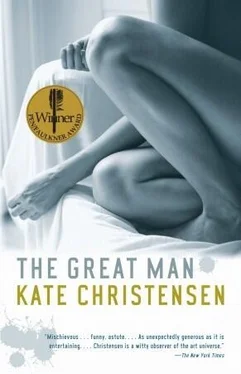“But what about her lack of possessiveness?” Ralph asked.
“Her lack of possessiveness was an illusion,” Ruby said.
“You mean,” he said cautiously, darting a glance toward the kitchen, “she gave him free rein as a paradoxical way of keeping him?”
“Yes…” said Ruby. “Exactly. But there’s more to it than that.”
Teddy stuck her head through the door and said, “Ruby, coffee?”
Ralph started a little; Ruby turned calmly and said, “Sure, Mom.”
After Teddy had gone back to the kitchen, Ruby looked at Ralph, shaking her head. “Aren’t I a terrible child, telling you my mother’s secrets while she waits on us hand and foot. By the way, I don’t get up to help her because she won’t allow it; she’s a total control freak in the kitchen. As well as in every other way. Anyway, her lack of possessiveness was an illusion. She was extremely possessive. Sexually, Dad was totally in Mom’s thrall — it was obvious to anyone with half an eye — so if he went off and had other women, it didn’t bug her. It was like the queen not minding if the king had consorts: She was still the queen. And meanwhile, kings always have their consorts; it’s part of the deal. Emotionally, she was very jealous. Like, for instance, she wouldn’t let us be close to him, his own daughters. She kept us all apart. She allowed him to go home to his poor fat wife only because she didn’t want him underfoot all the time and didn’t want him to get tired of her…. Did I mention that she’s a control freak?”
“But I don’t think you can boil marriages down into such codified structures. It seems more of a give-and-take to me, more of a flow. I think there must be much more to any relationship than people outside it can see.”
“Are you married?”
“No, are you?”
“No…”
“Not yet?” he asked.
“Maybe not ever.”
“Oh, I doubt that,” he said. “A woman as beautiful as you are.”
“Thank you,” said Ruby warily.
She’d meant to imply that she didn’t want to get married, and he’d meant “beautiful” as an abstract compliment; he hadn’t at all meant to come on to her, but all the same, an invisible bubble suddenly enveloped Ralph and Ruby and sealed them off, the filmy bubble of sexual possibility, which was awkward for them because they weren’t attracted to each other, but the continuation of this conversation, spooling itself out unspoken between them, nonetheless suggested something along those lines. Neither knew how to delicately convey this absolute lack of attraction to the other, so they just sat, not looking at each other, in a silence made more uneasy by the fact that it rode in the wake of their torrent of wine-fueled words, until Teddy strode in with the coffeepot and two cups and started pouring matter-of-factly, as if she hadn’t heard every word they’d said.
Maxine Feldman woke up early in a state of panicky despair and decided to clean her studio, one of her preferred solutions to any emotional upset. (The others, none of them mutually exclusive, were chain-smoking, brushing her dog, Frago, with a Love Glove, taking baths, and/or listening to turbulent music at full volume — Beethoven or Sonic Youth, it didn’t much matter which.) As she cleaned, she chain-smoked and listened to Dave Holland’s Conference of the Birds, which wasn’t turbulent; it was flat-out joyful, but that suited the morning sunlight. She was wearing men’s black trousers, size twenty-six long, thirty-two waist (Maxine liked to think of herself as squarely built rather than squat) and a baggy gray short-sleeved sweater that had once been all cashmere but now was at least half dog hair. Frago lay under her worktable, well out of the way of all the activity, but keeping a close eye on it nonetheless.
Maxine’s assistant, Katerina, had confessed the day before that she had fallen in love with someone. Whether this someone was a woman or a man, she didn’t say, and Maxine was too proud to ask. Katerina was thirty-eight, or so she claimed; Maxine suspected that either she was almost ten years older than that or the Soviet diet had caused her to sag a little at the jawline prematurely, not that it mattered or diminished her appeal. She was a jolie laide Hungarian with a sweet, gamine, slightly gap-toothed face and the kind of gymnast’s body that had always driven Maxine mad: petite, leggy, broad-shouldered, slim-hipped. More than that, she was intelligent, courageous, stalwart, loyal, and warm, all the qualities Maxine felt she herself lacked but had nonetheless always yearned for in a mate.
Anyway, that wasn’t going to happen. It had been a ridiculous idea. She was almost fifty years older than Katerina, for God’s sake.
As she worked at setting everything in order, she ignored the twinges, some more painful than others, in her back and shoulders and the joints of her elbows and knees. She hated being old. She caught sight of herself in the mirror by accident: Her face was sagging and consternated, her mouth awry, the eyes behind thick glasses squinting in concentration. She looked to herself like an ugly dwarflike toad.
All around her, hanging on walls and leaning against tables and lined up on shelves like books, were her paintings, finished or in progress or temporarily abandoned. She didn’t dare look at any of them in this mood. It was so hard to wake up every morning and manufacture the energy to continue this whole endeavor when she had all but lost faith in it. Who cared? None of it mattered. Wisps of black on canvas after canvas. Why black? More important, why wisps? When she was younger, she’d stayed up all night working. Each fresh black mark on the white canvas was an electric impulse generated by the energy in her head. Black because it was the negative image of the hot light she saw. Negative because she rebelled at positivity, the finiteness of a figure, the decadent arbitrariness of a full palette of color. The shapes were the only thing that varied from painting to painting — feathered or blunt edges, large or small wisps and blobs, curves or angles. What moved her brush was whatever impulse issued from her core, the spark created by the intersection of whatever was in the room and outside it, in her head and outside it, her mood and the weather, the political climate and the condition of her stomach. She had used her body as a source of light and heat, a high-speed muscle car that needed periodic pit stops to refuel and regenerate.
The ashes of that self-immolating fire were stored in the urn of her skull now, her memorial of that young artist who had believed so fervently in art, her own art especially. Now, mired in cynicism and defeat, she wondered whether it had really been so wonderful, the heyday of her artistic career. She had drunk too much booze, slept with a lot of women who’d hurt her badly, and never found lasting love. She’d made some money, it was true, and established some degree of a name; her paintings hung in the Modern and other museums around the world, but she’d never achieved the kind of fame that her ambition required of her. In her own mind, therefore, she was a failure. As the years wore on and she felt herself and her name fading, disappearing, being replaced by fresher talents, names, egos, canvases, and careers, she found it increasingly difficult to prop herself up every day, to resurrect her flagging drive through willpower alone, since hope was gone. And so it went for anyone who’d lost his or her faith. “I can’t go on I’ll go on.” Because what else was there to do? It wasn’t as if she were being tortured or oppressed or forced to endure in a Third World stew of horror. No one needed her except Frago, a midsize mutt who had been listed as a Lab-boxer mix when she’d rescued him eight years before from the ASPCA, although he resembled a mournful miniature hippo more than anything else. But Frago’s needs were minimal and had a built-in end point. If she didn’t paint, she might as well die, and that was all there was to it.
Читать дальше












